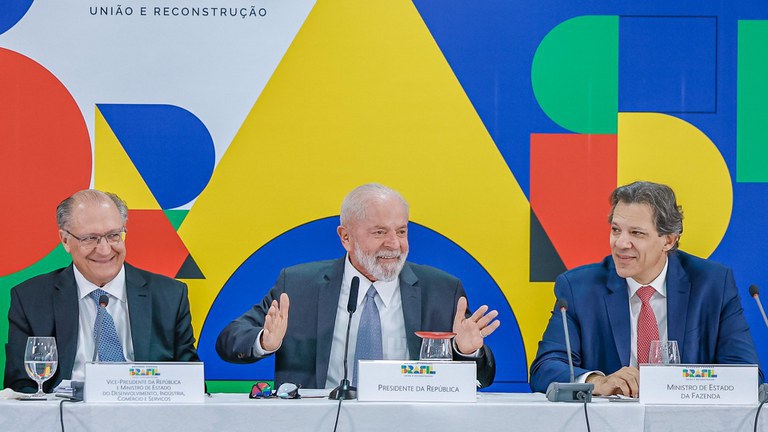Notícias
NEO INDUSTRIALIZATION
Brazilian steel announces BRL 100 billion investment following government measures

- Credit: Ricardo Stuckert
Steel sector representatives announced at Planalto Palace on Monday (20) BRL 100 billion in investments over the next five years to expand production capacity in Brazil.
The announcement – made in the presence of President Luiz Inácio Lula da Silva and Vice President and Minister for Development, Industry, Commerce and Services (Ministério do Desenvolvimento, Indústria, Comércio e Serviços/MDIC) Geraldo Alckmin – followed a series of measures by the Brazilian government to strengthen the national steel industry and make it more competitive.
Also present at the ceremony were ministers Fernando Haddad (Finance/Fazenda); Alexandre Silveira (Mines and Energy/Minas e Energia); Luciana Santo, (Science, Technology and Innovation/Ciência, Tecnologia e Inovaçāo/MDIC); and president of the BNDES development bank Aloizio Mercadante.
Alckmin said that the announcement upholds two important government priorities: increasing investment in Brazil and enhancing competitiveness.
Alckmin praised the ongoing dialogue with the productive sector and discussed the recent government measures to strengthen the national steel industry. “This was perfectly well understood by the entire industry and the result is BRL 100 billion in investments, improving competitiveness, decarbonization, generating jobs and income,” said Alckmin.
President Lula highlighted Brazil's positive momentum in attracting investments. “When the world thinks about the climate, about energy transition, they think about Brazil; Brazil is the hot ticket,” he said. The President said he will keep an eye on Minister Alckmin's agenda so he can make sure to highlight the “good things that are happening in this country”.
“When I chose Alckmin to be the minister, I said: we will make things happen—and they will. You can rest assured. This country is going to grow again,” said Lula.
BNDES President Aloizio Mercadante underscored that Brazil is up to date with the new global scenario, in which several countries have been investing heavily in strengthening their industries. “We are beginning to reverse Brazil’s deindustrialization,” he said, highlighting the role of the State in this process: “a State that induces, that is a partner, that helps finance and defend the productive sector.”
PROTECTIVE MEASURES - Among the government measures that encouraged the steel sector to make new investments in Brazil is the recent adoption of import quotas for 11 steel products over 12 months.
A decision by the Chamber of Foreign Commerce Executive Management Committee (Comitê Executivo de Gestão da Câmara de Comércio Exterior/Gecex) in April, an import tax of 10.8% to 14.4% will be applied intra-quota. Extra-quota, the import tax was set at 25%.
That decision came in response to pleas by the domestic steel sector that the government accepted in a context of oversupply in global steel production.
“Gecex’s decision brought hope to our industry, as a first step towards reducing the uncontrolled surge of imports into Brazil,” said Jefferson de Paula, president of the Board of Directors of Instituto Aço Brasil. “I reaffirm the steel industry’s willingness to engage in this effort to reactivate the country’s economic growth,” he said.
The president of the National Confederation of Industries (Confederação Nacional da Indústria/CNI), Ricardo Alban, compared the steel sector's announcement with the investments planned for the automotive sector following the launch of the Green Mobility and Innovation Program, MOVER (Programa de Mobilidade Verde e Inovação) in 2023.
“A year ago, we were talking about auto sales and now we’re discussing BRL 130 million in investments for that sector. At the end of last year, there was a talk of shutting down blast furnaces [in the steel industry], and today we are talking about BRL 100 billion in investments.”
According to the Organization for Economic Co-operation and Development (OECD), global steel production capacity reached 2.4 billion metric tons in 2023, or 552 million tons above global demand. China and India are the two largest producers, accounting for 47% and 6% of global capacity, respectively.
Following commercial protection measures by the US, the UK, the European Union and Mexico against steel from China, the latter has been seeking alternative markets for its surpluses. As a result, Brazil has seen a surge in Chinese steel imports that prompted calls for tariff increases.
In 2023, Brazil produced 31.9 million tons of crude steel and imported 5 million tons. When compared to 2022, importation increased 57.1%, while local production dropped 6.5%.
ANTIDUMPING - Meanwhile, MDIC's Foreign Trade Secretariat (Secretaria de Comércio Exterior/Secex) has intensified trade defense investigations against suspected dumping of various products, including steel.
There are currently 26 anti-dumping measures in force against steel products from 13 countries: China, India, Germany, Russia, Malaysia, Taiwan, Romania, Ukraine, South Africa, Vietnam, Thailand, Indonesia and South Korea.
Another 10 investigations are ongoing, all begun between 2023 and 2024 – four initial and six revisions – involving China, Malaysia, Thailand, Vietnam, India and Taiwan.
From: Ministry of Development, Industry, Commerce and Services